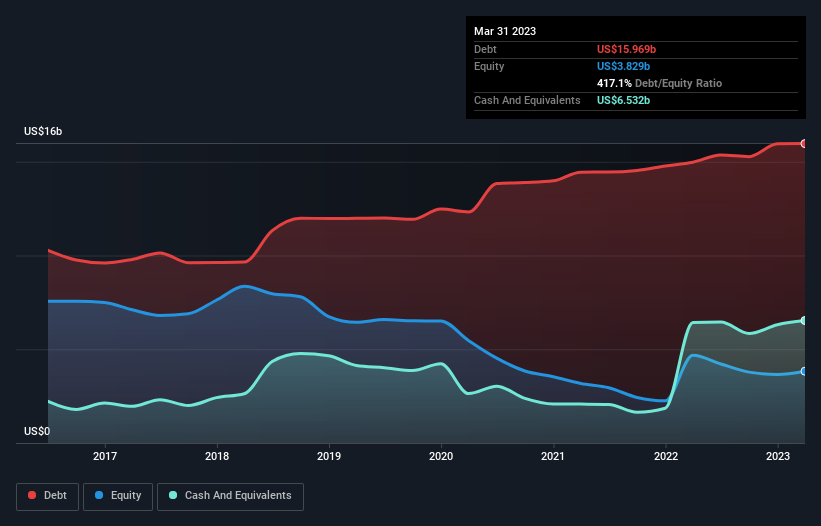
Legendary fund manager Li Lu (who Charlie Munger backed) once said, 'The biggest investment risk is not the volatility of prices, but whether you will suffer a permanent loss of capital.' When we think about how risky a company is, we always like to look at its use of debt, since debt overload can lead to ruin. We note that Las Vegas Sands Corp. (NYSE:LVS) does have debt on its balance sheet. But is this debt a concern to shareholders?
When Is Debt Dangerous?
Debt assists a business until the business has trouble paying it off, either with new capital or with free cash flow. In the worst case scenario, a company can go bankrupt if it cannot pay its creditors. However, a more common (but still painful) scenario is that it has to raise new equity capital at a low price, thus permanently diluting shareholders. Of course, plenty of companies use debt to fund growth, without any negative consequences. The first thing to do when considering how much debt a business uses is to look at its cash and debt together.
See our latest analysis for Las Vegas Sands
How Much Debt Does Las Vegas Sands Carry?
You can click the graphic below for the historical numbers, but it shows that as of March 2023 Las Vegas Sands had US$16.0b of debt, an increase on US$15.0b, over one year. However, because it has a cash reserve of US$6.53b, its net debt is less, at about US$9.44b.

A Look At Las Vegas Sands' Liabilities
The latest balance sheet data shows that Las Vegas Sands had liabilities of US$3.92b due within a year, and liabilities of US$15.0b falling due after that. Offsetting this, it had US$6.53b in cash and US$328.0m in receivables that were due within 12 months. So its liabilities total US$12.0b more than the combination of its cash and short-term receivables.
Las Vegas Sands has a very large market capitalization of US$45.9b, so it could very likely raise cash to ameliorate its balance sheet, if the need arose. But it's clear that we should definitely closely examine whether it can manage its debt without dilution. When analysing debt levels, the balance sheet is the obvious place to start. But it is future earnings, more than anything, that will determine Las Vegas Sands's ability to maintain a healthy balance sheet going forward. So if you're focused on the future you can check out this free report showing analyst profit forecasts.
In the last year Las Vegas Sands wasn't profitable at an EBIT level, but managed to grow its revenue by 33%, to US$5.3b. Shareholders probably have their fingers crossed that it can grow its way to profits.
Caveat Emptor
While we can certainly appreciate Las Vegas Sands's revenue growth, its earnings before interest and tax (EBIT) loss is not ideal. Indeed, it lost US$95m at the EBIT level. When we look at that and recall the liabilities on its balance sheet, relative to cash, it seems unwise to us for the company to have any debt. So we think its balance sheet is a little strained, though not beyond repair. Another cause for caution is that is bled US$807m in negative free cash flow over the last twelve months. So suffice it to say we do consider the stock to be risky. There's no doubt that we learn most about debt from the balance sheet. But ultimately, every company can contain risks that exist outside of the balance sheet. For instance, we've identified 2 warning signs for Las Vegas Sands (1 is potentially serious) you should be aware of.
If you're interested in investing in businesses that can grow profits without the burden of debt, then check out this free list of growing businesses that have net cash on the balance sheet.
New: AI Stock Screener & Alerts
Our new AI Stock Screener scans the market every day to uncover opportunities.
• Dividend Powerhouses (3%+ Yield)
• Undervalued Small Caps with Insider Buying
• High growth Tech and AI Companies
Or build your own from over 50 metrics.
Have feedback on this article? Concerned about the content? Get in touch with us directly. Alternatively, email editorial-team (at) simplywallst.com.
This article by Simply Wall St is general in nature. We provide commentary based on historical data and analyst forecasts only using an unbiased methodology and our articles are not intended to be financial advice. It does not constitute a recommendation to buy or sell any stock, and does not take account of your objectives, or your financial situation. We aim to bring you long-term focused analysis driven by fundamental data. Note that our analysis may not factor in the latest price-sensitive company announcements or qualitative material. Simply Wall St has no position in any stocks mentioned.
About NYSE:LVS
Las Vegas Sands
Owns, develops, and operates integrated resorts in Macao and Singapore.
Very undervalued with moderate growth potential.
Similar Companies
Market Insights
Community Narratives



